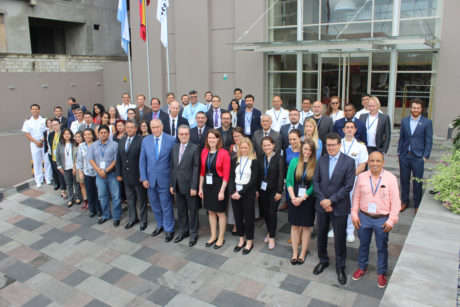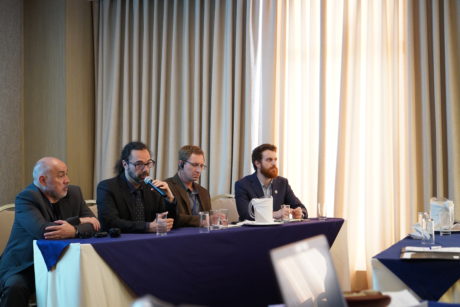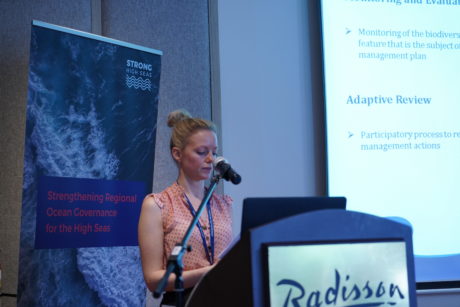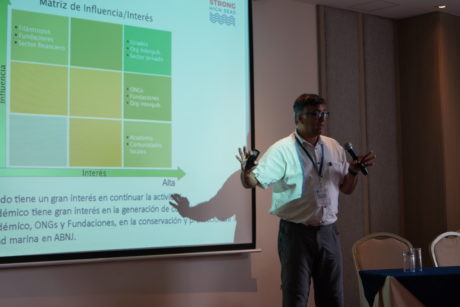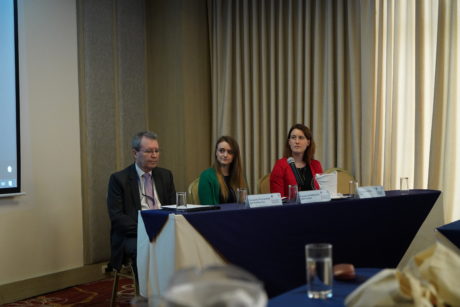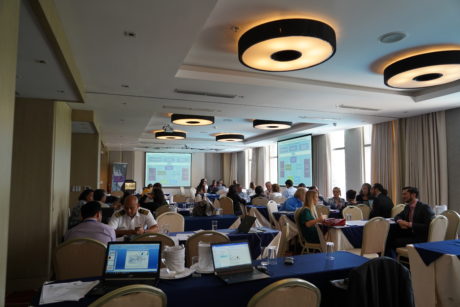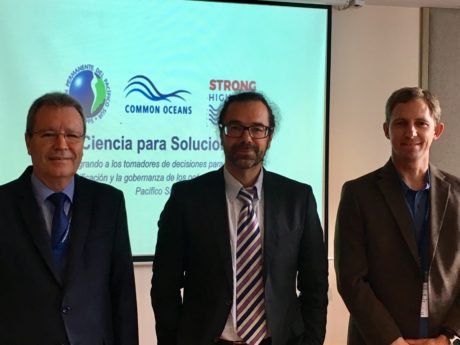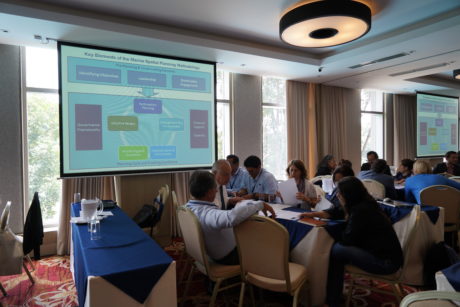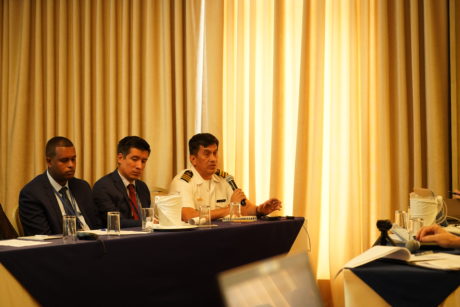Representatives from Colombia, Chile, Ecuador and Peru (CPPS member States) as well as Panama, global and regional organisations, regional scientific institutions, academia and NGOs took part in a three-day workshop from 13 – 15 March 2019 in Guayaquil, Ecuador. Organised by the STRONG High Seas Project, the ABNJ Deep Seas Project and CPPS Secretariat, the workshop was titled Science for solutions: bringing stakeholders together to improve ocean planning and governance of ABNJ in the Southeast Pacific. A varied programme including presentations, group and plenary discussions as well as interactive exercises, provided the total of 60 participants with an opportunity to discuss the current status, interests and challenges for global and regional ocean governance and to foster exchange and build new networks.
This workshop is part of a series of workshops organised under the ABNJ Deep Seas and STRONG High Seas projects in the Southeast Pacific region. This workshop will be the closing workshop of the ABNJ Deep Seas project, which will end in August 2019, and the second dialogue workshop of the STRONG High Seas project. The first dialogue workshop under the STRONG project took place in Cali, Colombia in June 2018, and three more are planned until 2022.
About the STRONG High Seas Project
The STRONG High Seas project (‘Strengthening Regional Ocean Governance for the High Seas’) is a five-year project that aims to strengthen regional ocean governance for the conservation and sustainable use of marine biodiversity in areas beyond national jurisdiction. Collaborating with the Secretariat of the Comisión Permanente del Pacífico Sur (CPPS; Permanent Commission for the South Pacific), the project aims to develop and propose targeted measures to support the coordinated development of integrated and ecosystem-based management approaches for ocean governance in the Southeast Pacific. The project also works with the Central Africa Regional Seas Programme (Abidjan Convention).
About the ABNJ Deep Seas Project
The ABNJ Deep Seas Project addresses the need to enhance sustainability and efficiency in the use of deep-sea living resources and biodiversity conservation in areas beyond national jurisdiction through the systematic application of an ecosystem approach. This project is one of the projects under the Common Oceans Program, supported by the Global Environment Facility (GEF). The Project is led by the Food and Agriculture Organization of the United Nations (FAO) and works in close collaboration with the United Nations Environment Program (UNEP) as well as other executing partners including UN Environment World Conservation Monitoring Centre (UNEP-WCMC), Regional Fisheries Management Organizations (RFMOs), national governments and NGOs.
Key messages from the workshop
- The workshop highlighted the progress of the ABNJ Deep Seas and STRONG High Seas (Strengthening Regional Ocean Governance for the High Seas) projects in the Southeast Pacific. The ABNJ Deep Seas project is ending in August 2019 and the STRONG High Seas project is in its second year of implementation (continuing until May 2022).
- Secretariat of the Comisión Permanente del Pacífico Sur (CPPS) member States reiterated the importance of the ABNJ Deep Seas and STRONG High Seas project for the region.
- This workshop offered a space for CPPS member States, the CPPS Secretariat, sectoral organisations and academia to present their work and discuss critical aspects relevant to areas beyond national jurisdiction (ABNJ) and marine biodiversity beyond national jurisdiction (BBNJ) issues. Workshop participants highlighted the importance of organising these dialogue workshops in the region to discuss issues related to ABNJ, and particularly in relation to the BBNJ process.
- The CPPS member States reiterated the importance of ABNJ for their country and their commitment to the BBNJ process under the UN for the development of an international agreement on the conservation and sustainable use of marine biodiversity in ABNJ.
- The BBNJ negotiations are challenging in many ways. CPPS member States have created an ABNJ Working Group under the umbrella of the CPPS to discuss BBNJ issues and help develop national positions and coordinate where possible to ensure a strong regional voice at the negotiations.
- Workshop participants highlighted the need to coordinate and strengthen links between the BBNJ process and other ongoing processes, such as under the International Seabed Authority (ISA) with regard to the development of the mining code, Convention on Biological Diversity (CBD) with regard to the identification of Ecologically or Biologically Significant Areas (EBSAs) or the Intergovernmental Oceanographic Commission of UNESCO (IOC-UNESCO) with regard to technology transfer.
- The role of CPPS with regard to ABNJ will depend on the development of the BBNJ negotiations and the legal and institutional framework that will be adopted. CPPS can play an important role in ensuring coordination and cooperation between its member States, by assessing the state of the negotiations and coordinating common positions on BBNJ within the region.
- Marine research is very costly, particularly in ABNJ, and knowledge about the marine environment in the Southeast Pacific is currently very limited. There is a need to generate, manage and standardise information to fill knowledge gaps about ABNJ in the region, including on species distribution and how human activities affect the marine environment. There is also a lack of data to build strong data models. Ensuring the exchange of scientific knowledge and technology transfer within the region is of particular importance. Workshop participants highlighted the importance of existing information tools, such as SPINCAM Atlas (Southeast Pacific data and information network in support to integrated coastal area management), and the need to seek support from academia to fill these gaps.
- The importance of sharing knowledge and experience between regions, such as on marine spatial tools and the identification of existing legal frameworks for their use in ABNJ, was underscored.
- Workshop participants highlighted the role of coastal States in the management of ABNJ as they can, for instance, take complementary measures with respect to marine protected areas or environmental impact assessments within their Exclusive Economic Zones (EEZs).
- Civil society needs to be strongly involved in the BBNJ negotiation process through the development of effective public consultation mechanisms, such as through open participation or academic committees.
- Workshop participants identified marine genetic resources (MGRs) and intellectual property rights as being topics for which capacity building is needed. It was shown during the workshop that technology to work on genetic resources is accessible in the region and that there is a need to train future researchers within the region to be able to use this technology.
- A multi-level stakeholder engagement platform for the region will require clear objectives, a common vision on the needs and interests of the different stakeholders of the region, sufficient financial resources to guarantee its long-term use, and be cost-effectively managed. In this regard, workshop participants also emphasised that cooperation amongst academics in the region is required as well as more science to underpin the development of policies.
The complete workshop summary can be found here in English and here in Spanish.
The workshop agenda can be found here in English and here in Spanish.
The workshop presentations can be found here (English and Spanish).
Photos: STRONG High Seas

